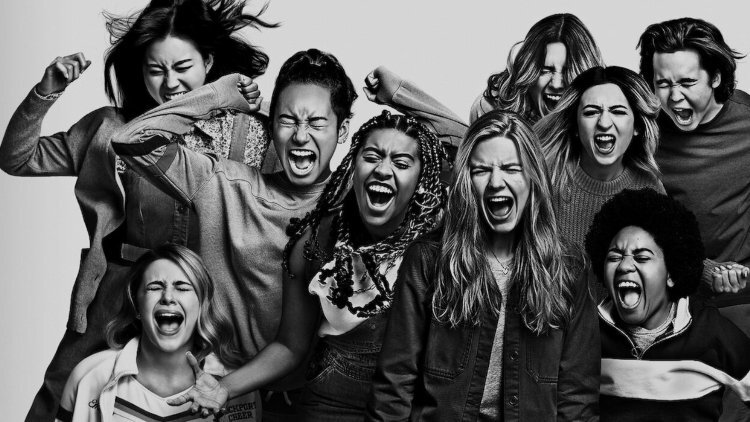Why Can’t We Have a POC Protagonist?
Moxie, directed by Amy Poehler, is based on a book of the same name by Jennifer Mathieu. It follows a shy high schooler, Vivian (played by Hadley Robinson), who gets inspired by her new friend, Lucy (played by Alycia Pascual-Peña), and her mother (played by Amy Poehler) to take a stand against sexism at her school. Vivian decides to address her frustration by publishing an anonymous zine calling out instances of sexism at her school. The zine then sparks a movement within the student body that challenges their school’s sexist culture.
The movie boasts a diverse cast and yet they are all notably supporting characters to Vivian, the white protagonist. These supporting characters are criminally underwritten and while Moxie addresses hot-topic issues for Gen Z such as unjust dress codes, harassment, rape culture, transphobia, and more it lacks the nuance to effectively address them.
Ultimately, Moxie misses the mark.
What’s most frustrating about the film is that there are countless opportunities for it to be truly intersectional yet it barely scratches the surface of the issue. Intersectionality is explicitly mentioned briefly when Vivian's mother reflects on her time and involvement in the riot grrrl era and the mistakes she made while protesting as a high schooler. Her mother, played by Amy Poehler, reflects saying: “We didn’t [know how to protest effectively]. You know, we made a ton of mistakes. We argued with each other. We weren’t intersectional enough. We called our meetings powwows.”
Vivian goes on to make many of these same mistakes, resorting to reckless behavior and failing to consider her privilege as she grows increasingly frustrated with her school and her personal life. There is abundant potential here to go more in-depth and while her best friend and boyfriend both call her out explicitly, it’s never brought up again despite it being a huge opportunity for the movie to dive into the different aspects of activism and privilege and how they are intertwined.
On the other hand, one thing Moxie gets right is the range and diversity within those involved in the movement at Vivian’s school. The casting choices for this group and their conversations show how sexism affects women in different ways. In these conversations, Kiera explains how being voted “Best Ass” isn’t as flattering as her white friends may think because it enables the historic objectification of Black women while Josie, a trans woman struggles with being dead-named, even by other girls at the school. Several scenes highlight the struggles and treatment of a woman with disabilities as well. Despite this, at the end of the movie, many of the struggles these women present are still unaddressed. This gives the impression that these characters are still just serving as background characters to Vivian’s movement rather than a representation of how feminism should be inherently intersectional.
Many critics have claimed the methods of protest are “unrealistic” but in reality, walkouts and social media are huge ways Gen Z has not only gotten involved with activism in the past but has been successful as well. Making this movie more true to the actual Gen Z experience and something this generation of activists could learn from would not be accomplished by changing the protest methods but rather by amplifying traditionally marginalized voices (such as Vivian’s friends) and telling the story from multiple perspectives instead of having a central main character. In the book Moxie is based on, Vivian is the main character so it’s understandable the production team would want to stay true to that aspect of the book, however, they missed the opportunity to bring in the perspectives of people of color, especially since these characters had just as much of a hand in forging this transformative movement within their school as Vivian did. Not only does pulling in these characters at a deeper level seem like a natural choice, it would also help illustrate how the next generation of activists have the power to be actively intersectional in their work – particularly, showing white and able activists when they need to step up by stepping back.
Undoubtably, pulling in these characters at a deeper level would make the movie infinitely more compelling and meaningful and could’ve been the transformative change in teen movies that’s desperately needed today. Moxie exemplifies the fact that if directors want to have more than just performative representation and truly empower youth of all kinds, POC characters can not be reduced to background characters as they were in this movie. Moreover, Hollywood needs to thoroughly examine why they are so afraid of having a POC protagonist and how they will make the changes necessary to address this going forward.
